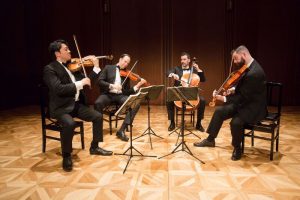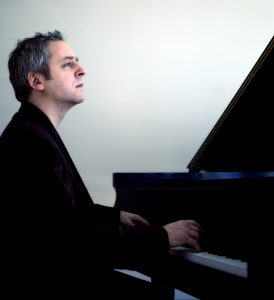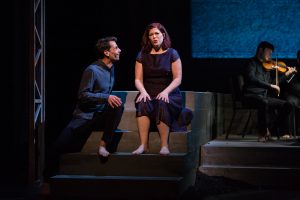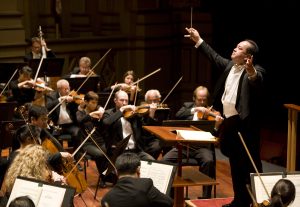San Diego Arts 2017: Classical Music
In terms of visitations from brilliant pianists, 2017 proved to be a notable year. Two nonpareil solo recitals—Jeremy Denk’s May recital at the La Jolla Presbyterian Church and Richard Goode’s November recital at the Irwin Jacobs Qualcomm Hall in Sorrento Valley—offered breathtaking technical and interpretive artistry. Each pianist anchored his recital in substantial works by J.S. Bach, and each traversed their instrument’s repertory into the 20th century with penetrating insight. These stellar American pianists were presented as part of the La Jolla Music Society’s highly respected piano series.
The San Diego Symphony started the year featuring the accomplished Israeli pianist Inon Barnatan, who gave electrifying performances of two rarely heard works, Aaron Copland’s 1926 Piano Concerto and Andrew Norman’s 2014 piano concerto “Suspend,” conducted by guest Andrew Gourlay. This concert opened the orchestra’s January festival of American Music. Of course, this critic dreams of the day when American music is programmed with such regularity by the San Diego Symphony that a festival of American music would be redundant!
In May, the Russian pianist Kirill Gerstein gave a thrilling account of Béla Bartók’s Third Piano Concerto with the San Diego Symphony under the German guest conductor Matthias Pintscher. The outstanding young American pianist Conrad Tao scored with his vivid performance of Mozart’s Piano Concerto No. 8, K. 246, with the Mainly Mozart Festival Orchestra under its Artistic Director Michael Frances in June.
Although San Diego Opera continued to present quality productions of grand opera in Civic Theatre, greater excitement bloomed in smaller venues around town. As part of the company’s new Dētour Series, under the direction of Alexander Gedeon, Peter Brook’s condensed, hyper-dramatic take on Bizet’s Carmen—which Brook titled La tragédie de Carmen—stirred full-house audiences at the Balboa Theatre downtown.
In November, that same series presented Laura Kaminsky’s recent compact, two-person opera As One at the Joan B. Kroc Theatre in San Diego’s suburban Rolando neighborhood. The Hausmann Quartet gave an exciting, muscular account of Kaminsky’s sophisticated but approachable score, and singers Kelly Markgraf and Blythe Gaissert beautifully unfolded the emotional and psychological development of the opera’s single transgender character.
With greater humor but equal depth, Bodhi Tree Concerts staged Peter Maxwell Davies’ neo-Expressionist 1969 8 Songs for a Mad King with fearless panache in a lower level banquet hall of the U. S. Grant Hotel as part of the San Diego Fringe Festival in June. Walter DuMelle’s formidable vocal prowess and savvy dramatic conflation of King George and Donald Trump—cleverly directed by Kim Strassburger—enthralled the eager audience.
Both Opera NEO and the Bach Collegium San Diego have proven amazingly resourceful in bringing obscure gems of western music to performance. I was quite taken by Opera NEO’s vocally radiant Armide by Christoph Willibald Gluck, staged outdoors at the Palisades Amphitheater in August by Stephanie Harvey. Peter Kozma’s orchestra displayed a laudable sympathy for the composer’s rich textures and buoyant melodic invention.
Although the Bach Collegium’s production of Handel’s English language opera Acis and Galatea was presented in concert format at Point Loma’s All Souls’ Episcopal Church, the sublime virtuosity of Artistic Director Ruben Valenzuela’s five vocalists made even the thought of stage action superfluous—even potentially distracting! Adding the sophisticated aplomb of Valenzuela’s elite period instrumentalists to this musical equation made the Bach Collegium’s evening of Handel nothing short of transcendent.

Miró Quartet: Daniel Ching, William Fedkenheuer, Joshua Gindele, John Largess. Photo by Suntory Hall
Three chamber music concerts stand out in my recollection of 2017. La Jolla SummerFest’s rich offering of Hungarian chamber music on a single program (August) included violinist Glenn Dicterow (former Concertmaster of the New York Philharmonic) playing his stunning interpretation of Zoltán Kodály’s Duo for Violin and Cello; the fleet Miró Quartet scoring with a shattering Bartók Fourth String Quartet, and Russian soprano Lyubova Petrova enchanting us with Bartók’s rarely heard cycle of s Slovak Folksongs. This November at the San Diego Museum of Art, Art of Élan’s evening of Latin American chamber music included delectable rarities such as Silvestre Revueltas’ Third String Quartet, a Suite for Solo Cello by Cuban composer Tania León, and the Heitor Villa-Lobos Quintet. Equally revelatory and polished was Camarada’s chamber music evening featuring San Diego Symphony Principal Trumpet Micah Wilkinson in chamber works by Johann Joachim Quantz and contemporary composers James Stephenson and Marcel Bitsch. I was fortunate to hear this engaging fall program in a home concert in Del Mar, but it was repeated on Camarada’s popular series at Balboa Park’s Mingei International Museum.
My report on the orchestral front remains a mixed bag: in the spring, the San Diego Symphony played several highly praiseworthy concerts under a parade of guest conductors, especially Markus Stenz’s towering account of Shostakovich’s First Violin Concerto with Augustin Hadelich as soloist. Stenz further strengthened his conducting credentials this November when he conducted a compelling Mozart Requiem with the San Diego Master Chorale, an ensemble whose musical profile continues to improve under the direction of John Russell.
In May, retiring Music Director Jahja Ling led a moving and predictably—for Ling—expansive interpretation of Gustav Mahler’s Third Symphony. But many of us in the music community are concerned that half a year after maestro Ling’s long anticipated retirement, the orchestra management has failed to hire a new Music Director. C.E.O. Martha A. Gilmer apparently relishes coming to the edge of Copley Symphony Hall’s stage to welcome audiences to a performance and to praise the orchestra. But how long can the orchestra’s performance level remain in good condition without a Music Director?
A visit from the Chicago Symphony in October proved sadly underwhelming. Of course the power and finesse of the Chicago Symphony remains one of the wonders of the modern world, and Riccardo Muti commands his troops with immaculate ease. But his quotidian programming—symphonies by Schubert and Schumann with the Mozart Clarinet Concerto—sent me out of the concert hall depressed, trying to bring back from the recesses of my musical memory a stirring Mahler Fifth that Sir Georg Solti and the Chicago Symphony played in the hall on a west coast tour many years ago.




I sang with the SD Master Chorale for ten years in the mid-eighties to mid-ninties under Frank Almond’s direction. I briefly worked with John Russell last year and he is doing wonderfully. I also was at the Civic Theatre in the early 1970’s to see and hear the great Chicago Symphony perform the Mahler 5th under Solti’s direction. I enjoyed the great beauty and talent of Dale Clevenger on French Horn and Adolph Herseth playing the famous trumpet solo in Mahler’s fifth.